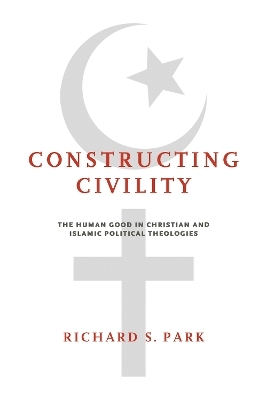
Constructing Civility
The Human Good in Christian and Islamic Political Theologies
Seiten
2017
University of Notre Dame Press (Verlag)
978-0-268-10273-9 (ISBN)
University of Notre Dame Press (Verlag)
978-0-268-10273-9 (ISBN)
Park develops a framework for universally applicable public civility in multi-faith and multicultural contexts by combining concepts of Roman Catholicism and Islam.
In Constructing Civility, Richard Park bridges Christian and Islamic political theologies on the basis of an Aristotelian ethics. He argues that modern secularism entails ideological commitments that can work against the promotion of public civility in pluralistic societies. A corrective outlook on public life and the public sphere is necessary, an outlook that aligns with and recovers the notion of the human good. Park develops a framework for a universally applicable public civility in multifaith and multicultural contexts by engaging the central concepts of the "image of God" (imago Dei) and "human nature" (fitra) in Roman Catholicism and Islam.
The study begins with a critique of the social fragmentation and decline of public life found in modernity. Park's central contention is that the construction of public civility within Christian and Islamic political theologies is more promising and sustainable if it is reframed in terms of the human good rather than the common good. The book offers an illustration of the proposed framework of public civility in Mindanao, Philippines, an area that represents one of the longest-standing conflicts between Christian and Muslim communities. Park's sophisticated treatment brings together theology, philosophy, religious studies, intellectual history, and political theory, and will appeal to scholars in all of those fields.
In Constructing Civility, Richard Park bridges Christian and Islamic political theologies on the basis of an Aristotelian ethics. He argues that modern secularism entails ideological commitments that can work against the promotion of public civility in pluralistic societies. A corrective outlook on public life and the public sphere is necessary, an outlook that aligns with and recovers the notion of the human good. Park develops a framework for a universally applicable public civility in multifaith and multicultural contexts by engaging the central concepts of the "image of God" (imago Dei) and "human nature" (fitra) in Roman Catholicism and Islam.
The study begins with a critique of the social fragmentation and decline of public life found in modernity. Park's central contention is that the construction of public civility within Christian and Islamic political theologies is more promising and sustainable if it is reframed in terms of the human good rather than the common good. The book offers an illustration of the proposed framework of public civility in Mindanao, Philippines, an area that represents one of the longest-standing conflicts between Christian and Muslim communities. Park's sophisticated treatment brings together theology, philosophy, religious studies, intellectual history, and political theory, and will appeal to scholars in all of those fields.
Richard S. Park is assistant professor of religion at Vanguard University.
Acknowledgements
Introduction
1. Religious Diversity and Public Civility
2. Modernity’s Mayhem and the Need for Moral Political Theory
3. The Decline of Public Life
4. A Case for the Human Good
5. The Human Good and Catholic Social Thought
6. The Human Good within Islamic Political Ethics
7. Public Civility and Islamic Political Theology
8. The Prospects of Public Civility
9. The Human Good and the Scope of Public Civility
Conclusion
Bibliography
| Erscheinungsdatum | 28.09.2017 |
|---|---|
| Verlagsort | Notre Dame IN |
| Sprache | englisch |
| Maße | 152 x 229 mm |
| Gewicht | 386 g |
| Themenwelt | Geisteswissenschaften ► Philosophie ► Ethik |
| Geisteswissenschaften ► Religion / Theologie ► Christentum | |
| Geisteswissenschaften ► Religion / Theologie ► Islam | |
| ISBN-10 | 0-268-10273-2 / 0268102732 |
| ISBN-13 | 978-0-268-10273-9 / 9780268102739 |
| Zustand | Neuware |
| Haben Sie eine Frage zum Produkt? |
Mehr entdecken
aus dem Bereich
aus dem Bereich


